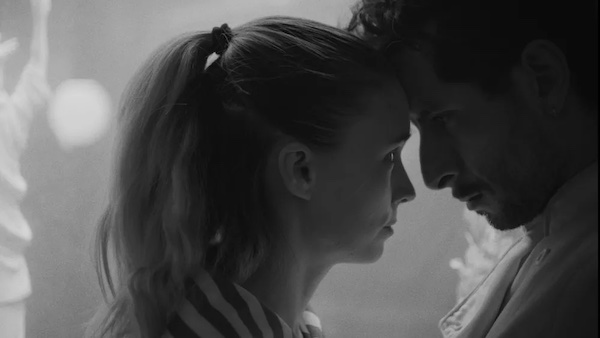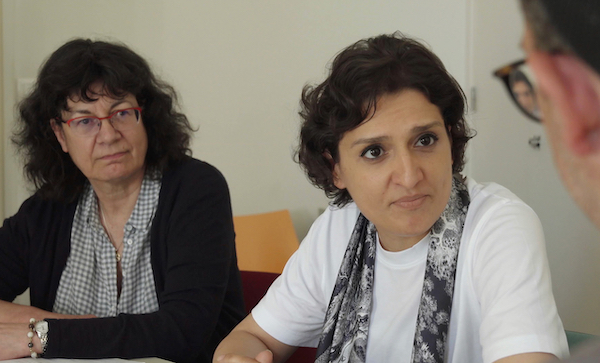At the Berlin International Film Festival: Alonso Ruizpalacios’s “La Cocina” and Nicolas Philibert’s “At Averroès & Rosa Parks”
A Mexican director sets a British play in a Times Square restaurant and patients talk to their psychiatrists in Paris.
By David D’Arcy

A scene from Alonso Ruizpalacios’s La Cocina. Photo: courtesy of Berlinale
Alonso Ruizpalacios brought La Cocina, his first film made outside Mexico, to the Berlin International Film Festival last week.
Ruizpalacios (b. 1978) represents a new generation in Mexican filmmaking. In 2014, he premiered Güeros, set amid student uprisings in 1999 at the National Autonomous University of Mexico. It wasn’t the fog of war, but the fog of youthful protest, loosely constructed by a filmmaker inspired by the French New Wave. Critics were impressed.
Ruizpalacios returned to Berlin in 2018 with Museo (Museum), a restrained and reflective comedy that retold the story of the theft of Mayan objects from the venerable National Museum of Anthropology in Mexico City. If that location and those props didn’t give Museo enough legitimacy, one of the upper-class layabout thieves was played by Gael Garcia Bernal, Mexico’s most popular actor. The cinematic heist and flight helped establish Ruizpalacios’s international reputation: it had echoes of Y Tu Mama Tambien (2001), a road movie by Alfonso Cuarón that followed two private schoolmates from Mexico City to the Pacific coast.
Big things were expected of Ruizpalacios after Museo and the subsequent A Cop Movie (2021), in which actors trained to be police officers in Mexico City. In La Cocina, he is going beyond the borders of Mexico with an adaptation of the strident 1957 British play The Kitchen by the then “angry young man” dramatist Arnold Wesker. The film is set in a high-volume tourist eatery around Times Square in New York.
Ruizpalacios calls his film “a metaphor for corporate capitalism” and has filmed it in black-and-white. We meet a stone-faced Mexican teenager, Estela (Anna Diaz), who arrives uninvited at The Grill. She is seeking work on the advice of a man named Pedro and is mistaken for a girl scheduled for a job interview that morning. The quiet teenager is without papers or a Social Security card, but she is asked to stick around and then told where to buy fake documents. The tone of her interview with a manager — who is several times her size — establishes her vulnerability, which is never really explored in a script in which Ruizpalacios is working with so many other elements.
In what is essentially a backstage drama (in a restaurant rather than a theater), most of the kitchen speaks Spanish, and the majority of the men and women spit out curses. Besides swearing and cooking, the staff fight, and they fall in love. Typical enough. Pedro (Raul Briones Carmona), an acquaintance from Estela’s village, is an irascible guy in a fraught relationship with pregnant Julia, played by Rooney Mara, the biggest name in the cast.
Add another plot element — the disappearance of more than $800 in cash from the accountant’s office (Pedro is a suspect) — and there’s enough conflict to eventually cover the walls with food.
Ruizpalacios has said in interviews that in this film he is out to show viewers how a restaurant operates, or doesn’t, in the case of this NYC establishment. He allows his characters to reveal themselves or, in the case of the silent Estela, to watch everyone else go at it. The food and the pots and pans are omnipresent props and, as might be expected (and intended by the director), they get in the way — unless you see them as percussive instruments in an everything-and-the-kitchen-sink composition of noise.
Lest anyone expect La Cocina to be a dramatic window onto the way a big restaurant in Times Square works, this film resembles a multiring circus — it is more of a spectacle than an exposé of the food industry. Its plausibility lies in performance and emotion, not verisimilitude. Much of what happens here wouldn’t actually happen in a kitchen, even though Ruizpalacios cites Anthony Bourdain as an inspiration. A warning — the edibles are unappetizing, even before they cover the walls.
La Cocina might feel a bit overdramatized, but keep in mind that Ruizpalacios is filming in New York for the first time, and he’s telling multiple stories with far less restraint than we usually see from him. Hence the overreaching and missteps. We’re given a ringside seat at a food fight, and this is the closest you’ll ever want to be to a restaurant in Times Square.

A scene from Nicolas Philibert’s documentary Averroès & Rosa Parks. Photo: courtesy of Berlinale
Also back at the Berlinale was the documentarian Nicolas Philibert, after winning its Golden Bear top prize last year for Sur l’Adamant (On the Adamant), set in (or on) a mental health center on a barge in the Seine where day patients are treated with civility in an atmosphere of humanity. This time Philibert is there to premiere Averroès & Rosa Parks, a poignant distillation of interviews with mental health teams and patients at a hospital in Paris.
These patients, who are men and women, talk about their lives and their families. They also detail the symptoms of mental illness that have put them in institutions. The interviewers, who are psychiatrists in practice or in training, ask probing questions and get revealing answers. Like Philibert, whose films emerge from patient observation, these psychiatrists let the patients speak. For all but a few cutaway shots, the director leaves the camera on the patients. This study in close-ups held my attention for more than two hours.
Inevitably, the patients’ accounts of their lives turn dark; the charming eccentricity that some might associate with Oliver Sacks is left behind. The psychiatrists and the director stress that at least the patients are talking, which happens rarely in today’s automated and drug-driven treatment of mental health. What is also rare, we see, is that someone is listening.
“Within an increasingly worn-out health system, how can the forsaken be given a place among others?” asked Philibert in an interview. At Averroès and Rosa Parks, the second installment in a planned trilogy, “is an extension of the first film. It’s a little as if, after having filmed the stage, this time I was showing the wings and basement. The atmosphere at the hospital is clearly not the same, the place is much starker and the patients who have ended up there are going through a period when they are more vulnerable, shakier. This is clear in the tone of the film, but it’s the same psychiatric care, or rather what remains of it: a form of psychiatry that still strives to take into consideration people’s words when the whole system, increasingly taken over by neurosciences, protocols, experts and evaluation scales, tends to crush that by banking on medication and nothing else.”
At Averroès & Rosa Parks did not win a prize in Berlin. Sur l’Adamant, from last year, comes to US theaters this spring.
David D’Arcy lives in New York. For years, he was a programmer for the Haifa International Film Festival in Israel. He writes about art for many publications, including the Art Newspaper. He produced and co-wrote the documentary Portrait of Wally (2012), about the fight over a Nazi-looted painting found at the Museum of Modern Art in Manhattan.
